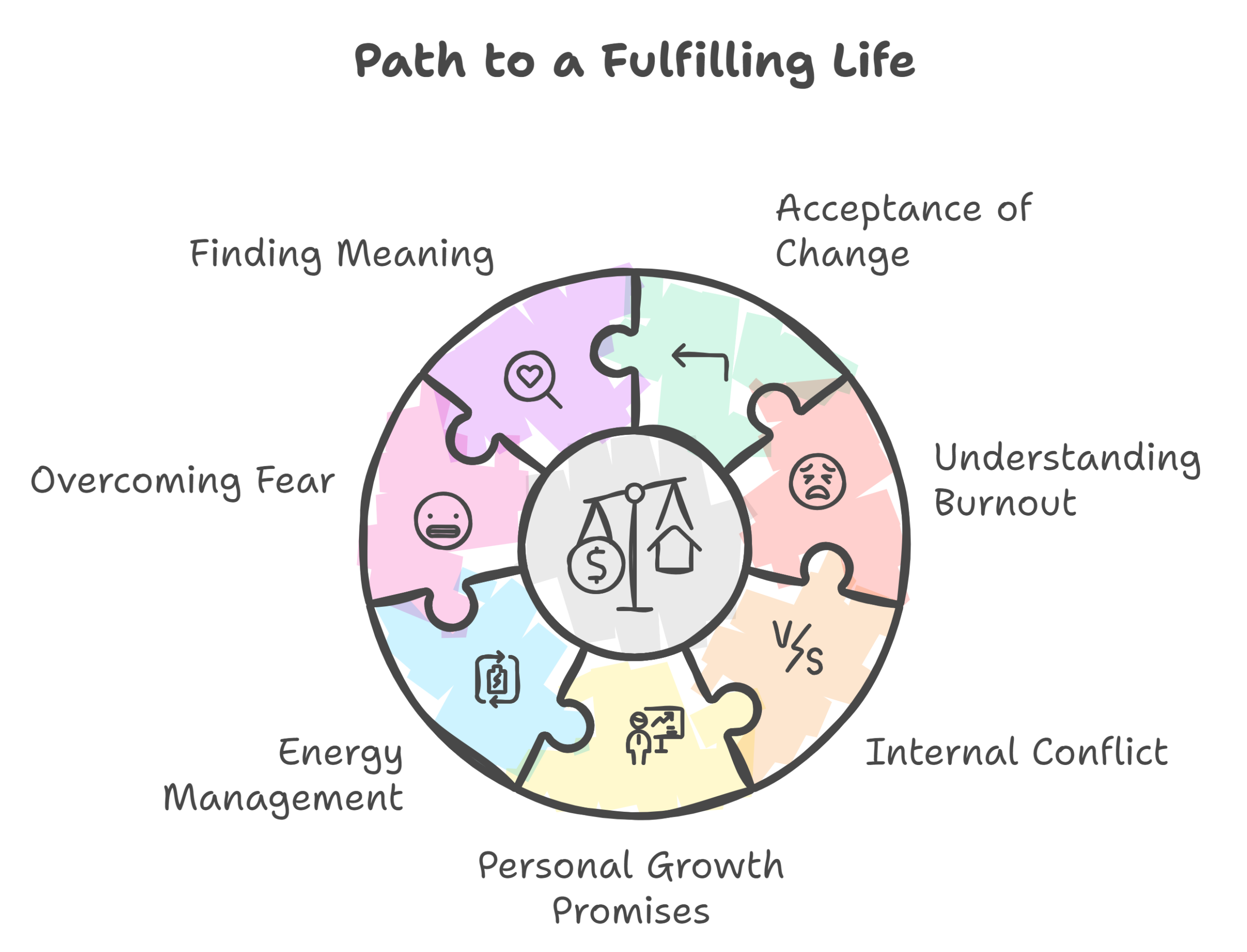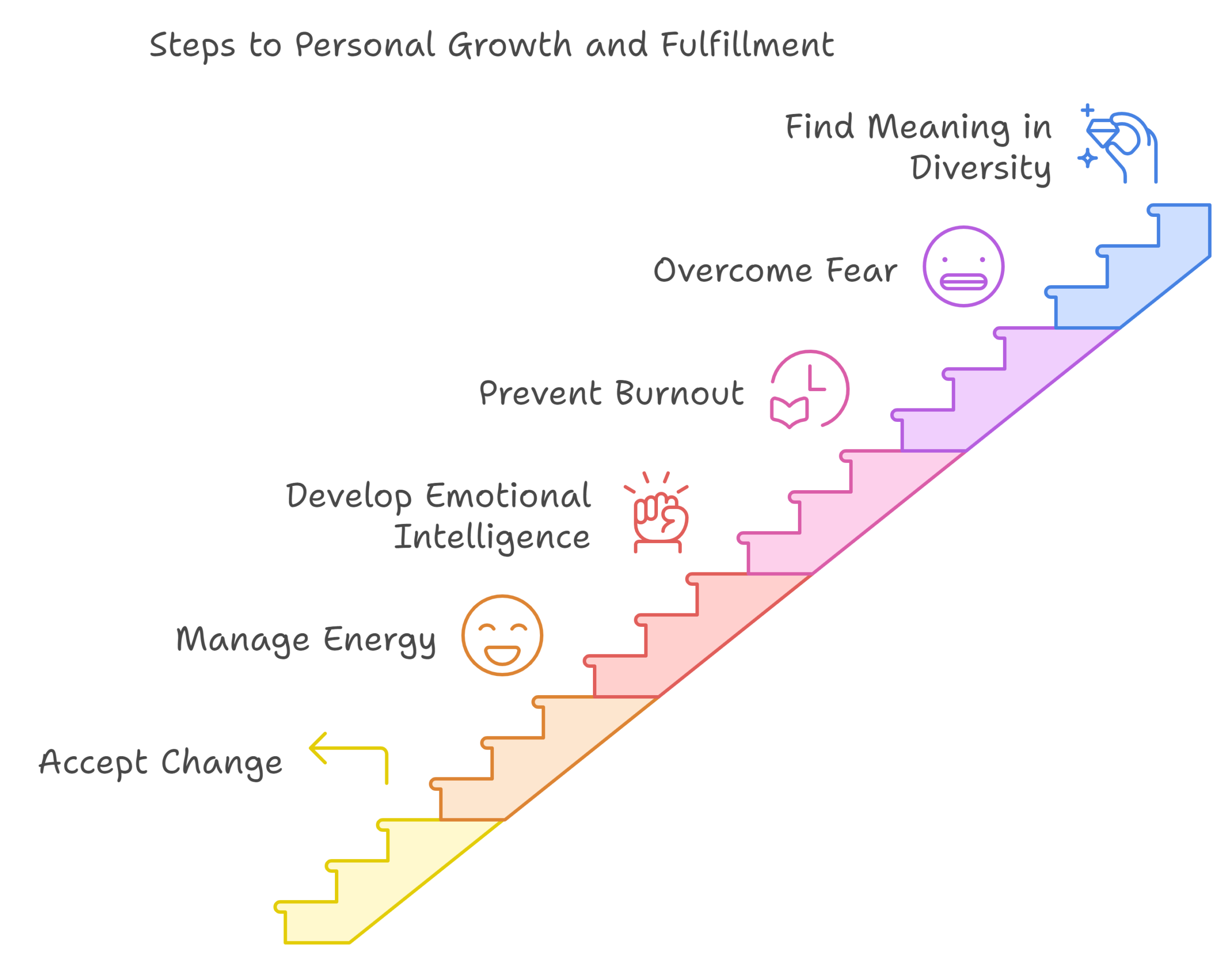

Modern life, full of stress and change, raises questions for everyone about how to live life to the fullest while maintaining a balance between career, relationships, and personal interests.
After listening to the lecture “How to Live Life to the Fullest?” Graham Weaver, presented at Stanford University in 2024, it became clear that the answers to these questions lie in a person’s ability to cope with change, manage their energy, and make conscious choices.

In this article, we will look at the key aspects that help people achieve goals, overcome challenges and find meaning in life, and discuss the impact of energy, fear and choice on the path to personal growth.

Acceptance of change and discomfort
Change is often uncomfortable, especially when it comes to changing jobs or ending a relationship. Often at first, the situation seems to get worse before it gets better.
However, it is a person’s ability to adapt and meet change readily that determines his or her future success.
| Change phase | Description | Human impact |
|---|---|---|
| Resistance period | The person is stressed and has doubts about the right choice | May be accompanied by deterioration of physical and mental condition |
| Adaptation period | The person begins to get used to the new condition and conditions | Reducing stress, initiating positive change |
| Growth period | Man reaches new heights and opportunities | Increased sense of self-confidence, increased energy resources |

Understanding burnout
Burnout is not always the result of recycling, more often it comes from the stress of not being able to achieve expectations – both one’s own and others’.
True energy and vitality come when one is doing what one loves. This leads to a sustainable and fulfilling life.
| Causes of burnout | Signs | Solutions |
|---|---|---|
| Excessive expectations | Chronic fatigue, cynicism, decreased efficiency | Re-evaluating goals, attracting support |
| Lack of balance between work and rest | Constant feeling of being pressed for time, irritability | Restoration of the daily routine, introduction of rest periods |
| Lack of understanding of one’s own goals and desires | Loss of motivation, emotional detachment. | Self-reflection, change of activity or its conditions |
Internal conflict: fear and intuition
Every person has two “voices” inside him/her: one is the voice of fear, aimed at survival and avoidance of danger, and the second is the voice of intuition, which helps to realize dreams and aspirations.
Fear limits, restrains from actions, and intuition guides to goals and personal growth.
Strategies for dealing with internal conflict:
- Recognizing fear as a natural reaction.
- Appealing to intuition and analyzing inner desire.
- Regular reflection to understand true motives.

Three promises for personal growth
Personal growth requires a clear plan and deep inner work. There are three promises a person can make to themselves to move forward:
Promise 1: Remove the “nail”-recognizing and solving personal problems.
Promise 2: Follow energy, not just passion.
Promise 3: Full commitment to one’s goals and interests, without half-measures.
| Обещание | What it means | The result. |
|---|---|---|
| Remove the “nail” | Recognizing and addressing internal issues that impede forward movement | Improvement of emotional state, release of energy |
| Follow the energy | Openness to new interests and opportunities, flexibility | A sense of full realization and development |
| Total return | Do not limit yourself in your aspirations, go all the way to the end | Achievement of set goals, satisfaction from the process |

Energy as the main resource
Energy is a key resource for a fulfilling life.
It builds up when you do things you really enjoy and find meaning in. Energy is contagious – it not only improves your life, but also positively affects your surroundings.
Overcoming fear and taking action
Many people delay action because of fear of failure or uncertainty.
However, recognizing and confronting these fears is an important step toward achieving goals. One effective method is to make a list of fears and gradually overcome them.
| Fear | How to overcome it |
|---|---|
| Fear of failure | Accepting failure as part of the growth process |
| Fear of uncertainty | Developing flexible plans and preparing for possible changes |
Searching for the meaning of life
The search for the meaning of life is a universal task. A full life is built through active participation in events that resonate in the heart, through pursuing one’s interests and achieving inner harmony.
| Source of meaning | Example |
|---|---|
| Work and realization in the profession | A person sees the results of his labor and gets satisfaction from it |
| Family and relationships | Strengthening the emotional bond and creating a sustainable environment |

Conclusion
A fulfilling life is more than just achieving material goals or fulfilling responsibilities.
It is the art of finding a balance between inner aspirations and outer demands, between what we want and what society or circumstances may impose.
It involves listening to one’s inner voice and finding harmony between energy, passion and conscious action.
In order to achieve this state, it is important to develop a number of skills and adopt key life principles that will help make the path to personal growth and inner fulfillment clearer and more accessible.
Practical tips for living a fulfilling life:
Accept change willingly.
Life inevitably changes, and your ability to adapt to new conditions is an important factor in success.
Don’t be afraid of discomfort at first – it’s a normal part of the process.
Recognizing temporary difficulties as a step on the road to improvement will help you deal with them more confidently.
Keep an eye on your energy resources.
Real energy comes when you are doing something you really enjoy.
Develop the habit of noticing what brings you joy and inspiration.It is important to realize that energy is contagious: if you are filled with it, you can inspire others.
Therefore, try not only to work, but also to relax, engaging in something that brings you satisfaction.
Develop emotional intelligence and reflection.
Learn to distinguish between the voice of fear and the voice of intuition.In moments of stress or inner uncertainty, ask yourself: is this choice made under the influence of fear or is it the voice of my true self?
Regular moments of self-reflection will help you better understand your motives and make more informed decisions.
Manage burnout before it starts to manage you.
Burnout is not just fatigue, it is a deep state of exhaustion, when a person loses touch with his or her own desires and goals.
Timely rest and revision of goals, especially if they seem unattainable, will help prevent this condition.
It is important to notice the signs of burnout in time and take steps to prevent it: restoring sleep patterns, time for yourself and open conversations with loved ones.
Do not be afraid to act, even if there is fear of making a mistake.
Often the fear of error or failure keeps us from taking important steps.
One useful tool is the technique of making a list of fears.
Write down everything that bothers you and look at these fears from a critical perspective.
Most of them will turn out to be less serious than they appear at first glance.
This process helps reduce their impact and motivates you to take action.
Look for meaning in diversity.
Life is not limited to a single goal or accomplishment.
Wholeness lies in the richness of experiences you have through active participation in events.
Don’t look for one “meaning of life” but see life as a series of opportunities for growth, self-discovery, and building deep connections with others.
Be patient and consistent.
Personal growth and inner fulfillment do not come instantly.
It is a process that takes time, effort, and constant steps forward.But if you follow your energy and desires rather than external expectations, you can create a life that fills you every day.
Life is a series of choices between fear and authenticity.
The more often you choose to follow your true self, the closer you will be to living a full and fulfilling life.
It is important to remember that this is a path that requires not only awareness, but also a willingness to work on yourself.



